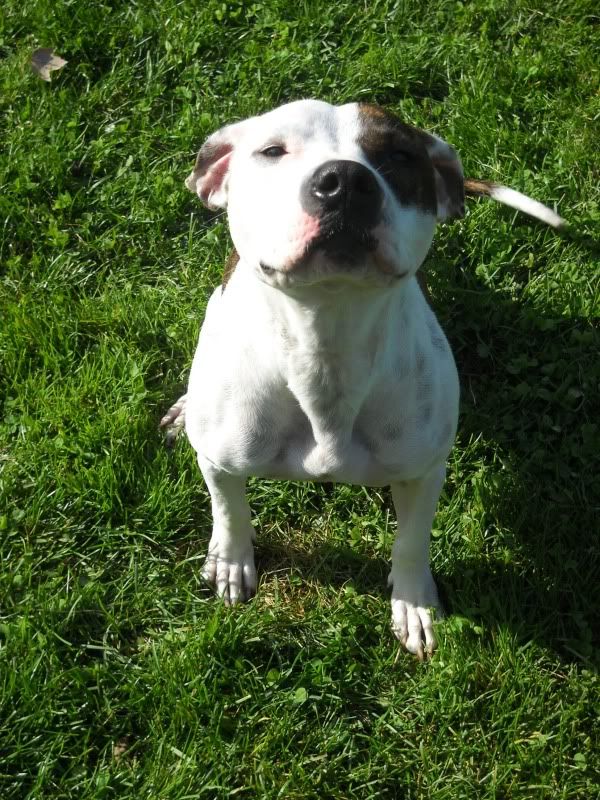People are confused about terminology, and we want to help you make some sense of it all.
Over the past decade or so, many new terms have gained widespread usage in Pit Bull circles. Most of these terms have no official definition and the user can ascribe whatever meaning he or she chooses in the moment. It's pretty common to see one term used in multiple, contradictory ways.
A prime example of misleading, confusing term-usage is "bully breed". It gets used:
* to refer to a group of similar breeds with no clear boundaries or definitions
* interchangeably with "Pit Bull"
* to reference a breed, as in "the bully breed" (what the heck is "the bully breed"?)
"Pit bull type dog" is being used in much the same way as "bully breed" is now. People are using it to refer to a myriad of breeds not even closely related to Pit Bulls. It's causing mass confusion and the side effect is a LOT more dogs are being described as Pit Bulls when they are anything but (we've seen Dogos repeatedly lumped in as "pit bull type dogs" lately, for instance).
For these reasons, RPB uses neither the term "pit bull type dog" nor "bully breed".
The mixed up, mish-mosh of words being thrown around, misused, misapplied, and improperly defined is really grating, and has resulted in a lot of *head-on-desk* moments for us lately. A huge stumbling block to creating united efforts to save and protect Pit Bulls is a complete lack of a common language amongst guardians, advocates, and rescuers. It's pretty difficult to do your job when communication is hampered due to language barriers.
The Real Pit Bull is here to educate, encourage, support, and yes, learn, too! We've upgraded our vocabulary over the years, tweaked our use of certain terminology, and dropped certain idioms altogether. Why? Because words are powerful and important; they are never "just words". Words can hurt and words can heal. Misuse of terms, vague definitions, and sloppy wording make everyone's job more difficult; common, positive, precise language brings people together and helps facilitate beneficial change.
With these thoughts in mind, here are some entries from our Pit Bull lexicon:
-Pit Bull - We only use it to refer to the AMERICAN PIT BULL TERRIER or dogs thought to be purebred American Pit Bull Terriers. It is ridiculous to call anything but APBTs "Pit Bulls", and we've got plenty to say as to why, but we'll save that for another blog. For now, let's just leave it at this: if you insist on using "pit bull" as a group name for a variety of breeds and dogs with certain overly-general physical traits, PLEASE DON'T use APBT-specific breed info (such as history, breed personality traits, famous APBTs, and so on) when refering to said group.
Example: don't say, "Pit bull is just a category and not a breed and there is no such thing as a 'pit bull' ", then go on to quote a bunch of APBT-specific facts, features, and figures after you just got done insisting "pit bull" does not refer to a specific breed.
-Pit Bull mix - Breed rescue is guess work! Period. Most of the time NO breed rescue group has proof that the dogs they are pulling into their programs are bonafide, 100% purebred. That doesn't mean that experts in their breed of choice cannot make good guesses as to whether or not a dog brought into rescue is or is not the breed its supposed to be. Sometimes a dog kinda-sorta looks like its all or mostly Pit Bull, but just not quite. These are the dogs we call Pit Bull mixes.
-"There are many breeds mistaken for or incorrectly called Pit Bulls (APBTs)" - we use this phrase when addressing the fact that lots of breeds through the years have been misidentified or incorrectly called "Pit Bulls". The widespread misapplication of the shorthand form of the APBT's name started mostly with the media and subsequently with legislators who, when drafting BSL, wanted to make sure they included the two breeds - the American Staffordshire Terrier and the Staffordshire Bull Terrier - that looked very similar and had similar histories to the American Pit Bull Terrier (and arguably, the AmStaff IS the same thing as the APBT, anyway).
-Dog-sensitive - as a breed temperament trait. We define dog-sensitivity as, "The tendency to become stressed, anxious, fearful or defensive around other dogs." Yes, we are *gasp!* generalizing! If we can generalize that this breed is great with people, we can generalize that this breed is also prone to dog-sensitivity.
-Cruelty/abuse victim - the term we use for dogs who have been abused - regardless of that abuse (including dogs that have suffered at the hands of dog fighters).
Terms and phrases we strongly urge you to avoid:
-Bait dog
-"Pit Bulls are great dogs when raised right!"
-"It's all how you raise them."
-"Pit Bulls are a dog-aggressive breed" or "Pit Bulls are genetically prone to aggression" (aggression is a behavior, not a trait!)
-"There is no such thing as a pit bull"
-Bully breed or Pit bull type dog (meaningless terms with no clear definitions or usage-boundaries)
























